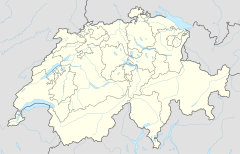Lucerne railway station
|
Luzern
|
|
|---|---|
| Central terminal railway station | |

Bus station in front of the railway station
|
|
| Location | Bahnhofplatz CH-6003 Lucerne, LU Switzerland |
| Coordinates | 47°2′56″N 8°18′38″E / 47.04889°N 8.31056°ECoordinates: 47°2′56″N 8°18′38″E / 47.04889°N 8.31056°E |
| Elevation | 443 m (1,453 ft) |
| Owned by | SBB CFF FFS (Swiss Federal Railways) |
| Operated by |
|
| Line(s) |
Zürich–Lucerne Gotthard (Lucerne branch) Olten–Lucerne Bern–Wolhusen–Lucerne Brünig railway |
| Platforms | 7 |
| Tracks | 14 (German: Gleis) |
| Connections | www |
| SGV | |
| S-Bahn | |
| VBL, PostAuto | |
| two train connections per hour to/from Zürich Flughafen in c. 1:10h | |
| Construction | |
| Structure type | at-grade |
| Depth | 0 |
| Platform levels | 1 (3 passenger levels) |
| Parking | underground |
| Bicycle facilities | openair, covered, secured (Velostation) |
| Architect |
|
| Other information | |
| Fare zone | Passepartout: 10 |
| Website | www |
| History | |
| Opened | 1856 wooden construction |
| Rebuilt | 1896, 1983-1989 |
| Electrified | 1922 |
| Key dates | |
| 5 February 1971 | A fire fully destroyed the building |
| Traffic | |
| Passengers (2014) | 91,800 per working day |
| Rank | 6 of 1735 |
| Location | |
Lucerne railway station (German: Bahnhof Luzern) is a major hub of the rail network of Switzerland, in the city of Lucerne in the canton of Lucerne. It is a terminal station serving domestic and international traffic on several rail lines, and is situated in a city centre and waterfront location on the south side of Lake Lucerne.
The first station was opened on edge of Lake Lucerne in 1856 at the end of the Schweizerische Centralbahn main line from Olten and Basel where it connected with the French and German railways. The route of the railway—now the course of Pilatusstrasse (Pilatus Street)—was still undeveloped. The terminal station led directly to the pier for boat services on the lake and to the gates of the city of Lucerne. As a result, the area at the lake shore developed into an important railway junction. In the 19th century it rapidly developed into a hub with the introduction of steam navigation on the lake and the construction of several railway lines: the Gotthard railway, the line to Bern via Wolhusen, the line to Zug and Zürich and the metre-gauge Brünig railway. The first station was made of wood.
A new station was opened in 1896 with a large new building with a distinctive cupola. It was turned at almost 90° to the original station with its end to the north towards the bridge to central Lucerne, requiring a significantly changed approach line. The new approach had no level crossings of streets unlike the original route, but instead ran on embankments or in cuttings. The Brünig railway was also integrated into the new station. The tracks were electrified in 1922 along with the line from Olten. By 1910 the new station was nearing its capacity limits and an expansion plan was developed. However, the start of World War I prevented any work being carried out.
On the morning of 5 February 1971 fire broke out in the staff quarters of station. The building burnt fiercely, and within an hour the cupola had collapsed, destroying the station frontage and concourse. The service was restored with temporary buildings, allowing operations to be recommenced. In 1980 a partnership of the Swiss Federal Railways, Swiss Post, the city and canton of Lucerne launched an architecture competition for a comprehensive redevelopment of the station. This also considered the future development of the rail approaches to Lucerne. However, a through station with a tunnel under Lake Lucerne was ruled out.
...
Wikipedia

